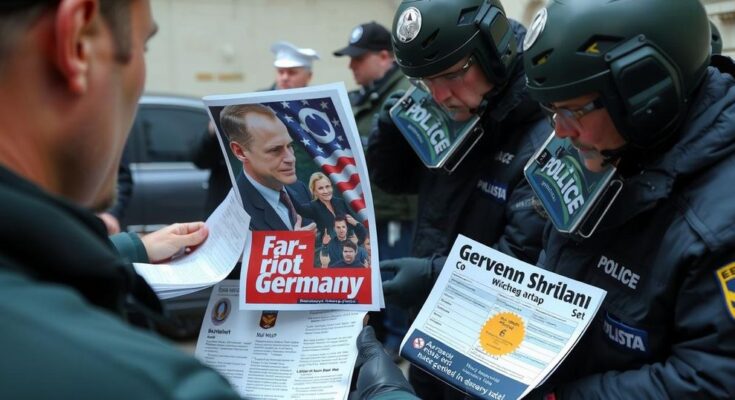German police are investigating a far-right election flyer by the AfD resembling a plane ticket, calling for the deportation of undocumented immigrants. Approximately 30,000 flyers were distributed, sparking accusations of incitement to hatred. The mayor of Karlsruhe criticized the flyer as fear-inducing, while public sentiment supports expedited deportations. The AfD has gained about 20% support in polls, yet other parties refuse to collaborate with them. Meanwhile, Germany faces a significant skilled labor shortage, needing 400,000 immigrants annually.
German authorities are currently investigating a controversial election flyer distributed by the far-right party Alternative for Germany (AfD) in Karlsruhe, which resembles a plane ticket and calls for the deportation of “illegal immigrants.” Approximately 30,000 of these flyers were disseminated, leading to a police investigation under suspicions of inciting hatred. The mayor of Karlsruhe condemned the flyer as fear-inducing, emphasizing that such tactics should not be part of an electoral strategy. Furthermore, the AfD’s recent campaign has taken a starkly anti-migration stance, advocating for both border closures and mass deportations of asylum seekers, which has drawn significant criticism from political leaders, including Interior Minister Nancy Faeser.
This situation unfolds amidst rising concerns over Germany’s ailing economy and migration, central issues for many voters. Recent polls indicate that the AfD has garnered about 20% support, positioning them second in the upcoming elections. Despite their growing popularity, other political factions remain unwilling to collaborate with the AfD, particularly due to its controversial immigration policies. Chancellor Olaf Scholz has reiterated commitments to expedite deportations for rejected asylum applications, reflecting a broader public sentiment favoring stricter immigration controls, although specific calls for broad deportations differ among parties.
The AfD previously attempted to distance itself from extreme far-right rhetoric but appears to have shifted back towards a more openly anti-immigration agenda, evidenced by statements made by their chancellor candidate, Alice Weidel, during a recent party convention. This pivot has sparked apprehensive reactions from various political figures and social groups, intensifying discussions surrounding Germany’s immigration policy crisis.
Germany is currently grappling with a significant shortage of skilled labor, necessitating around 400,000 skilled immigrants annually as the workforce undergoes an aging process. Critics worry that the AfD’s anti-foreign sentiments could dissuade potential migrants, complicating an already challenging labor market.
The relationship between migration and political sentiment in Germany has become increasingly polarized in recent years, particularly with the rise of the Alternative for Germany (AfD) party, which has gained traction by capitalizing on economic anxieties and public concern regarding immigration. As international migration continues to influence the socio-economic landscapes of nations, German public opinion has also shifted, with many advocating for expedited deportations of individuals lacking legal asylum status. The AfD, while initially seeking to moderate its stance, has reverted to invoking strongly nationalistic sentiments, complicating the political landscape in the context of labor shortages and societal cohesion. The current political environment poses significant implications for Germany’s demographic future, as policymakers weigh the nation’s need for skilled labor against the backdrop of rising domestic tensions regarding immigration. Contributions from the AfD, a party framed by many as extremist, challenge existing norms in German politics and provoke substantial debate surrounding national identity and humanitarian considerations in immigration policy.
In summary, the controversy surrounding the AfD’s election flyer has underscored the ongoing tensions regarding immigration policies in Germany. As the political landscape shifts with the AfD’s rising support, the implications for both social cohesion and the economy are significant. The government faces a dilemma in balancing public sentiment for stricter immigration controls with the urgent need for skilled workers. This dynamic will likely play a crucial role in shaping Germany’s political discourse in the coming elections.
Original Source: www.washingtonpost.com




